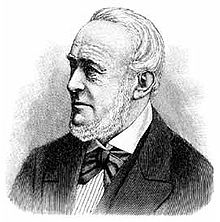Sybel-Ficker controversy


The Sybel-Ficker controversy (
Heinrich von Sybel fired the first shot in the dispute in an 1859 lecture, in which he condemned the medieval politics of the German Empire as "unnational". Julius Ficker countered in 1861 in lectures at the
Background
The controversy's roots are in the
The disagreement over the politics of the medieval Empire was important because those should determine the political direction and the national identity of the first national German state. Comments by
Sybel's position suggested the kind of imperialist thinking that found its expression in the famous Drang nach Osten phrase and had become a reality in the Ostsiedlung, the migration and settlement of German-speaking peoples during the Holy Roman Empire. Sybel leaned on this development, even though it hadn't started under Heinrich I but rather in the 12th century, first past the Elbe and then across the Oder, the settlement that had created Prussia, Saxony, and Silesia in Slavic areas. At the inception of the Alldeuscher Verband, this movement was reiterated: "The old drive toward the East should be restored".[4] The development by Friedrich Ratzel, in 1898, of the idea of Lebensraum supported this settler colonialism, which came to be seen as an alternative for the transatlantic migration to America..
Bibliography
- Schneider, Friedrich (1940). Die neueren Anschauungen der deutschen Historiker über die deutsche Kaiserpolitik des Mittelalters und die mit ihr verbundene Ostpolitik. Weimar.
{{cite book}}: CS1 maint: location missing publisher (link) - Friedrich Schneider (Hrsg.): Universalstaat oder Nationalstaat. Macht und Ende des Ersten deutschen Reiches. Die Streitschriften von Heinrich von Sybel und Julius Ficker zur deutschen Kaiserpolitik des Mittelalters. Innsbruck 1941.
- Wolfgang Wippermann: Der ‚Deutsche Drang nach Osten‘. Ideologie und Wirklichkeit eines politischen Schlagwortes. Darmstadt 1981, ISBN 3-05-003841-1.
- Frank Helzel: Ein König, ein Reichsführer und der Wilde Osten. Heinrich I. (919–936) in der nationalen Selbstwahrnehmung der Deutschen. transcript, Bielefeld 2004, H-Soz-u-Kult und H-Net Reviews).
- ISBN 3-05-003841-1.
- Rienow, A.: Der Streit zwischen Heinrich von Sybel und Julius Ficker. In Foerster, S. et al. (Hrsg.): Blumen für Clio: Einführung in Methoden und Theorien der Geschichtswissenschaft aus studentischer Perspektive. Marburg 2011, S. 237–269, ISBN 978-3-8288-2572-7.
External links
- Archived 9 June 2010 at the Wayback Machine
- Thomas Brechenmacher: Wieviel Gegenwart verträgt historisches Urteilen? (google books)
References
- ^ Friedrich Schneider, 1940, p. 22. de:Friedrich Schneider (Historiker)
- ^ Wilhelm Giesebrecht: Geschichte der deutschen Kaiserzeit. Volume 1: Gründung des Kaisertums. Braunschweig 1863 [first published 1855], page VI. Quote: "Überdies ist die Kaiserzeit die Periode, in der unser Volk, durch Einheit stark, zu seiner höchsten Machtentfaltung gedieh, wo es nicht allein frei über sein eigenes Schicksal verfügte, sondern auch anderen Völkern gebot, wo der deutsche Mann am meisten in der Welt galt und der deutsche Name den vollsten Klang hatte."
- ^ Schneider, 1941, page 15.
- ^ Wippermann, 1981, page 87.
